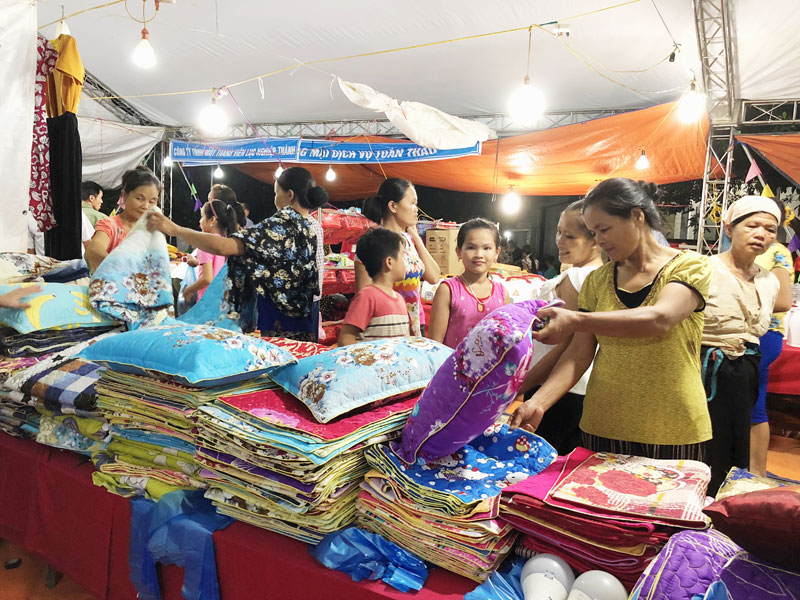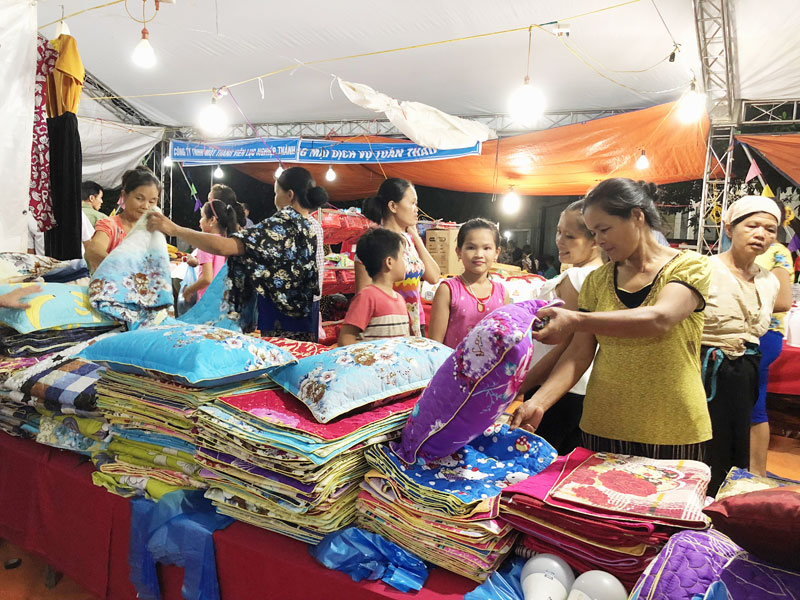
(HBO) - After 10 years of implementing the campaign "Vietnamese people prioritise using Vietnamese goods”, the northern province of Hoa Binh has brought locally-made products closer to people in rural and far-flung areas which have economic difficulties and unfavourable transport systems.
 A
market selling Vietnamese goods in the remote commune of Tu Ne, Tan Lac
district, draws a large crowd of locals and visitors.
A
market selling Vietnamese goods in the remote commune of Tu Ne, Tan Lac
district, draws a large crowd of locals and visitors.
More and more enterprises and manufacturers
inside and outside the province are participating in the programme and
supplying a diverse range of products suitable with the demands and preferences
of customers in rural and remote areas such as garments, household appliances,
aluminum and plastic products, porcelain ware, school supplies, electronic
products, telecom services, food, and agricultural production tools.
Manufacturers have also paid great attention to improving
the quality of products to satisfy consumers. Many businesses joining the
programme have reported steady growth in revenues through years, averagely
increasing by 1.5-2 times.
Chu Van Thang, Deputy Director of the provincial
Centre for Tourism, Trade and Investment Promotion Centre, said since 2009, Hoa
Binh has opened 34 markets selling Vietnamese goods in rural and remote areas
in Lac Son, Kim Boi, Tan Lac, Yen Thuy, Lac Thuy, Da Bac, Mai Chau and Cao
Phong districts. Of which, 18 were under the national trade promotion programme
in 2012, 2014, and 2018 with total expenses of nearly 2.4 billion VND (103,200
USD).
The programme will continue to be held in 2019
with the organisation of at least four markets in remote areas, he said, adding
that such events have been attracting more visitors, helping build trust of
customers in locally-made products.
The quality of the programme has been improved
through years, Thang said. Every year, the markets are held in different
regions to increase the spread of the campaign "Vietnamese people prioritise
using Vietnamese goods” among customers in rural and remote areas, he added.
According to data from the Hoa Binh Provincial Party Committee, the industrial production index for the first six months of 2025 is estimated to have increased by 20% compared to the same period last year. This marks the highest year-on-year growth rate for this period since 2020.
In the first six months of 2025, Hoa Binh province’s export turnover was estimated at 1.145 billion USD, marking an 18.11% increase compared to the same period in 2024. Import turnover was estimated at $ 804 million, a 17.15% increase, which helped the province maintain a positive trade balance.
The lives of the ethnic minority farmers in Tan Lac district have gradually improved thanks to the new directions in agricultural production. This is a testament to the collective strength fostered through the professional associations and groups implemented by various levels of the district’s Farmers’ Union.
With the motto the "product quality comes first,” after nearly one year of establishment and operation, Muong village’s Clean Food Agricultural and Commercial Cooperative, located in Cau Hamlet, Hung Son Commune (Kim Boi district), has launched reputable, high-quality agricultural products to the market that are well-received by consumers. The products such as Muong village’s pork sausage, salt-cured chicken, and salt-cured pork hocks have gradually carved out a place in the market and they are on the path to obtaining the OCOP certification.
In the past, the phrase "bumper harvest, rock-bottom prices" was a familiar refrain for Vietnamese farmers engaged in fragmented, small-scale agriculture. But today, a new spirit is emerging across rural areas of Hoa Binh province - one of collaboration, organisation, and collective economic models that provide a stable foundation for production.
Maintaining growing area codes and packing facility codes in accordance with regulations is a mandatory requirement for agricultural products to be eligible for export. Recently, the Department of Agriculture and Environment of Hoa Binh province has intensified technical supervision of designated farming areas and packing facilities to safeguard the "green passport" that enables its products to access international markets.



 A
market selling Vietnamese goods in the remote commune of Tu Ne, Tan Lac
district, draws a large crowd of locals and visitors.
A
market selling Vietnamese goods in the remote commune of Tu Ne, Tan Lac
district, draws a large crowd of locals and visitors.